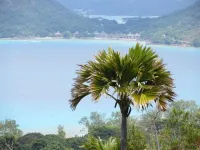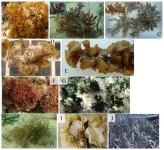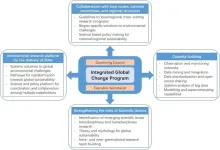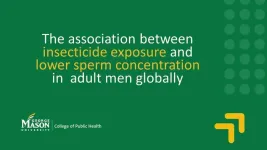(Press-News.org) From the depths of the seas to snow on mountains and even the air above cities, microplastics are turning up increasingly often. Now, in ACS’ Environmental Science & Technology Letters, researchers have analyzed microplastics in clouds above mountains. They suggest that these tiny particles could play a role in cloud formation and, in turn, affect weather.
Microplastics — plastic fragments smaller than five millimeters — originate from a myriad of items used daily, such as clothing, packaging and car tires. As research in the field evolves, scientists are not only detecting microplastics in the atmosphere but also investigating how they may play a role in cloud formation. For example, a group of researchers recently detected plastic granules, which had water-attracting surfaces, in Japanese mountaintop clouds. So, to learn more, Yan Wang and colleagues set out to look for microplastics in mountain clouds, used computer models to figure out how they could have gotten there, and tested how the particles could have impacted — and been impacted by — the clouds.
Wang and the team first collected 28 samples of liquid from clouds at the top of Mount Tai in eastern China. Then they analyzed the samples and found:
Low-altitude and denser clouds contained greater amounts of microplastics.
Particles were made of common polymers, including polyethylene terephthalate, polypropylene, polyethylene, polystyrene and polyamide.
The microplastics tended to be smaller than 100 micrometers in length, although some were as long as 1,500 micrometers.
Older, rougher particles had more lead, mercury and oxygen attached to their surfaces, which the researchers suggest could facilitate cloud development.
To investigate where the plastic particles in the clouds originated, Wang and the team developed computer models that approximated how the particles traveled to Mount Tai. These models suggested that airflow from highly populated inland areas, rather than from over the ocean or other nearby mountains, served as the major source of the fragments. In laboratory experiments, the researchers demonstrated that microplastics exposed to cloud-like conditions — ultraviolet light and filtered cloud-sourced water — had smaller sizes and rougher surfaces than those exposed to pure water or air. Additionally, particles impacted by the cloud-like conditions had more lead, mercury and oxygen-containing groups. These results suggest that clouds modify microplastics in ways that could enable the particles to affect cloud formation and the fate of airborne metals. The researchers conclude that more work is needed to fully understand how microplastics affect clouds and the weather.
The authors acknowledge funding from the National Natural Science Foundation of China.
The paper’s abstract will be available on Nov. 15 at 8 a.m. Eastern time here: http://pubs.acs.org/doi/abs/10.1021/acs.estlett.3c00729
The American Chemical Society (ACS) is a nonprofit organization chartered by the U.S. Congress. ACS’ mission is to advance the broader chemistry enterprise and its practitioners for the benefit of Earth and all its people. The Society is a global leader in promoting excellence in science education and providing access to chemistry-related information and research through its multiple research solutions, peer-reviewed journals, scientific conferences, eBooks and weekly news periodical Chemical & Engineering News. ACS journals are among the most cited, most trusted and most read within the scientific literature; however, ACS itself does not conduct chemical research. As a leader in scientific information solutions, its CAS division partners with global innovators to accelerate breakthroughs by curating, connecting and analyzing the world’s scientific knowledge. ACS’ main offices are in Washington, D.C., and Columbus, Ohio.
To automatically receive news releases from the American Chemical Society, contact newsroom@acs.org.
Follow us: Twitter | Facebook | LinkedIn | Instagram
END
Not so silver lining: Microplastics found in clouds could affect the weather
2023-11-15
ELSE PRESS RELEASES FROM THIS DATE:
Association of molecular subtypes in bladder cancer with response to neoadjuvant chemotherapy, progression, and survival
2023-11-15
Considering the molecular subtype of muscle-invasive bladder cancer (MIBC) based on differences in tumor RNA expression can improve the ability of an existing tumor biomarker such as the COXEN score to predict which patients’ tumors are likely to respond to chemotherapy given before surgery. Individual molecular subtypes, however, were not associated with significant differences in patients’ overall survival (OS) or progression-free survival (PFS) times.
Those are the conclusions from a secondary analysis of data from the S1314 clinical trial, a large study in patients with MIBC that was conducted by the SWOG Cancer Research Network, a clinical trials group funded by ...
Colliding ribosomes activate RNA repair
2023-11-15
Aldehydes are toxic compounds that are produced in the body by metabolic processes, especially upon alcohol consumption. They are dangerous because they bind to cellular macromolecules such as DNA, RNA, and proteins, and crosslink them.
Crosslinking damage to DNA must be repaired by the cell to prevent premature aging and cancer. However, it was previously unknown whether and how cells sense and resolve crosslinking damage to single-stranded RNA. A team led by Professor Julian Stingele from ...
On two small islands in the Indian Ocean, an endangered palm with the world’s largest seed sows a lesson about landscape restoration
2023-11-15
Every tree species has its story. Unraveling all 73,000 of them is a significant undertaking for science, in no small part because a considerable proportion of tree biodiversity is tropical, rare, remote and subject to the ravages of deforestation. And an estimated 9,200 tree species have yet to be discovered.
Even trees well-known to science have mysteries. One is the Seychelles’ endangered coco de mer, or sea coconut palm tree, which is now relegated to parts of two small Indian Ocean islands and in decline. Only some 8,200 individuals remain.
What Lodoicea madivica lacks in range it makes ...
New scientific study reveals the crucial role of herbivorous fishes and sea urchins in restoring Caribbean coral reefs
2023-11-15
A new study by Dr. Lindsay Spiers (Florida Fish and Wildlife Conservation Commission) and Professor Thomas Frazer (College of Marine Science at the University of South Florida), published in PeerJ Life & Environment, presents crucial findings on the feeding preferences of herbivorous fishes and the sea urchin Diadema antillarum in Little Cayman. The study, titled "Comparison of feeding preferences of herbivorous fishes and the sea urchin Diadema antillarum in Little Cayman," sheds new light on the dynamics of these herbivores and their impact on the resilience of Caribbean coral reefs.
Caribbean coral reefs face significant challenges, ...
The Future of Future Earth: How global science programs can navigate the complex, shifting challenges in sustainability science
2023-11-15
The global change program Future Earth is an international alliance of organizations and agencies that was launched by the UN in June 2012. The Future Earth 2025 Vision identified eight global challenges for scientific research to accelerate progress in sustainability, improve collaboration, and mobilize resources.
After more than a decade of this global change program, researchers are analyzing the challenges Future Earth has faced and the path forward. Discussion presented in a recently published paper reviews these challenges faced by the coalition and proposes solutions to help these programs meet the many needs of the global community.
The paper was published on ...
Georgetown Global Health Center launches first open-access wildlife disease database
2023-11-15
WASHINGTON (November 15, 2023) – Georgetown University Medical Center’s Center for Global Health Science and Security (GHSS) today announces the launch of a first-of-its-kind wildlife disease database -- a system for collecting records of viruses, bacteria, fungi, parasites, etc. -- designed to support an early warning system for potential viral emergence. The Pathogen Harmonized Observatory, or PHAROS, is open to the global community and free to access.
Scientists in GHSS’ Verena program, a collaborative ...
University of Basel delivers first biological implants for treatment of cartilage lesions and osteoarthritis in humans
2023-11-15
The Department of Biomedicine at the University of Basel and the University Hospital Basel, today announced that it delivered the first surgical procedure to treat Osteoarthritis (OA) in humans. The procedure called Nasal Chondrocyte Tissue-Engineered Cartilage, or N-TEC, provides an innovative alternative to cure confined knee cartilage lesions as well as to address degenerative OA cases that have to date required knee joint replacements – prosthetics that routinely need replacing after 15-20 years.
The team at Basel is spearheading the next-generation human clinical trials that will ...
From 2018 to 2022, eating disorder claim lines increased 65 percent nationally as a percentage of all medical claim lines
2023-11-15
NEW YORK, NY—November 15, 2023—From 2018 to 2022, eating disorder claim lines increased 65 percent nationally as a percentage of all medical claim lines.[1] All eating disorders studied increased during this period, but at different rates: avoidant/restrictive food intake disorder (ARFID) by 305 percent,[2] binge-eating disorder by 81 percent, anorexia nervosa (anorexia) by 73 percent and bulimia nervosa (bulimia) by 3 percent. These and other findings on eating disorders are reported in a FAIR Health white paper released today: Spotlight on Eating Disorders: An Analysis of Private Healthcare Claims.
Eating ...
NTU Singapore’s strength in research excellence sees it ranked 22nd globally and first in Singapore with most number of highly cited researchers
2023-11-15
Nanyang Technological University, Singapore (NTU Singapore) is up one spot to 22nd globally in this year’s Highly Cited Researchers list by Clarivate, a United Kingdom-based data company.
For the sixth year running, the University has the largest number of influential scientists among Singapore institutions recognised, with 42 NTU researchers that have significant and broad influence in their fields of research named.
These 42 scientists account for 44 mentions in the list, with two individuals recognised more ...
New study finds association between insecticide exposure and lower sperm concentration in adult men
2023-11-15
EMBARGOED until November 15, 2023
Contact: Michelle Thompson
George Mason University
mthomp7@gmu.edu
703-993-3485
New study finds association between insecticide exposure and lower sperm concentration in adult men
Comprehensive systematic review of 25 studies over nearly 50 years reveals consistent evidence of associations between insecticide exposure and lower sperm concentration
FAIRFAX, Va – Melissa J. Perry, Sc.D., MHS, dean of the George Mason University ...






